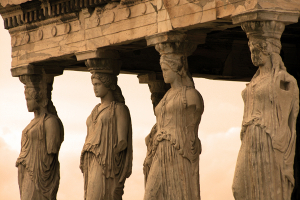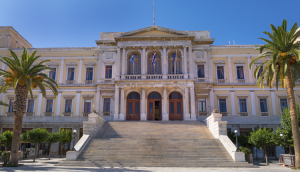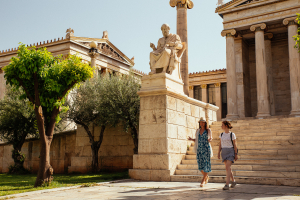BUSINESS CENTRE
XpatAthens
Athens For The Kids
Five Interesting Facts About The Acropolis Of Athens
1. It’s Not The Only Acropolis In Greece
The term ‘Acropolis’ derives from the Greek words ‘akron’, which means highest point or edge, and ‘polis’, which means city. Therefore, the word acropolis literally means ‘Highest City’. Even though the term mostly refers to the Acropolis of Athens, there are in fact, quite a few acropolises in Greece such as Acrocorinth in Corinth, Cadmea in Thebes, and the Acropolis of Lindos in the island of Rhodes.
2. The Acropolis And The Parthenon Are Not The Same Thing
Many visitors to Greece come to Athens thinking that the Acropolis and the Parthenon are the same thing. However, the Acropolis is actually the hill where the Parthenon and other structures such as the Erechteion, the Propylaia, and the Temple of Athena Nike are built upon!
3. The Parthenon Is Perfect Due To Its Imperfections
Even though the Parthenon is often referred to as the ‘word’s most perfect building’ its perfection is actually achieved through a series intentional flaws. Ictinos and Kallikrates, used a couple of architectural tricks, such as the slight angling of the temple’s pedestal, and the unnoticeable barrel-like curves on its columns, to create an optical illusion of perfection and impeccable alignment.
4. The Parthenon Was Blown Up in 1687
In 1687 the Parthenon suffered the greatest damage in its long history! During the Morean War, a Venetian cannonball blew up the Ottoman gunpowder magazine that was located inside the Parthenon, causing great damage to the temple. Before leaving Athens, the Venetians considered blowing up the rest of the Parthenon to avoid its further use as a Turkish stronghold, but thankfully the idea was abandoned!
5. The Acropolis Used To Be A Kaleidoscope Of Color
Recent tests have revealed that the Parthenon, and other buildings on the Acropolis Hill, were once covered in color. Even though the colors have been bleached over the years, the traces of blue, red, and green pigments that were discovered on various archaic sculptures show that these sites were once painted in a kaleidoscope of colors.
When visiting the Acropolis Museum, keep an eye out for the Archaic sculptures that have retained traces of their original colors. Furthermore, the museum offers a fun interactive online application, which allows users to color, save, and print the statue of Peplos Kore.
Syros: A Classy Year-Round Island Destination
Even Ermoupoli, Syros' capital, has a dual identity. Ermoupoli is stately and grand, topped with an Orthodox church, while above it, Ano (Upper) Syros is a typical Cycladic village, crowned with Catholic monasteries and churches.
The beautiful amalgamation of marble-paved squares, exquisite mansions, traditional settlements, and crystal clear beaches bestow Syros with a unique, elegant character that can't be seen anywhere else in Greece.
Syros is a year-round destination; in fact, it is a place you could live in throughout the year, so much is there to do!
7 Things To See And Do On Syros
1. Visit Vaporia
The neighborhood of Vaporia in Ermoupoli is where the island's captains of industry built their beautiful townhouses, all with sweeping views to the sea. Step inside the blue-domed church of Agios Nikolaos to find an interior that reflects its patrons' wealth: a marble icon screen and pulpit, and chandeliers brought in from Trieste.
2. Explore Ermoupoli
Ermoupolis is the bustling yet elegant port town of Syros. Marble flagstones pave its spacious main square, home to the majestic Town Hall, one of the 19th-century masterpieces of Ernst Ziller, the famous Saxon architect who became a Greek national. Graceful, neoclassical buildings emit an aura of old-world charm. Buildings such as the restored Apollo Theatre (a miniature of La Scala in Milan), the Hellas Club, and the Pallas cinema are perfect examples of yesterday's elegant urban architecture.
3. Taste Loukoumia: The Traditional Syros Sweets
The loukoumia from Syros(also known as Turkish Delight in English) are soft and chewy, flavored with rosewater, mastic, bergamot, pistachios, and almonds. According to locals, the water, not the sugar nor flavorings, makes them so delicious. Be aware that they are addictive, so don't forget to take plenty with you when you leave.
4. Visit Ano Syros
In contrast to Ermoupplis, Ano Syros has all the features of a typical Cycladic village. Its white cubist houses are nestled on a steep hillside, linked by narrow alleys and occasionally opening up onto spectacular terraces. Two things make Ano Syros unusual: the catholic monasteries and the Cathedral of Saint George on its summit and the bouzouki tunes of famous musician Markos Vamvakaris that can still be heard in its shops and squares. A native of Syros, Vamvakaris was one of Greece's greatest rebetika (blues) musicians.
5. Explore The Island's Beaches
Remember these names: Galissas, Delfini, Kini, Finikas, and Dellagratsia, where the island's elite built their splendid summer villas. Their serene landscapes, sheltered water, and pretty coves are ideal for a tranquil family holiday.
6. Visit The Industrial Museum
Part of Syros' former industrial district has been transformed into a museum. Wander among its buildings to see permanent exhibits related to its history and its shipping and industrial heritage.
7. Discover Grammata Bay
Grammata in Greek means letters, and at Grammata Bay in northern Syros, there are letters carved on the rocks. Generations of seamen washed up on this isolated coast and inscribed their wishes, prayers, and names on them. Most of the carved letters date back to the Roman and Byzantine eras. You can reach Grammata Bay by boat or on foot.
To learn more about the island of Syros, please visit: discovergreece.com
Navarino Challenge: Sports Unite People For The 7th Consecutive Year
Open Water Swimming In Pylos
On Saturday October 12, amateur and professional athletes can swim alongside silver Olympic medalist and world champion in open water swimming, Spyros Gianniotis, at the picturesque harbor of Pylos, at the site of the critical naval battle that led to Greece’s independence. The open water swimming race by Vikos, approved by the Hellenic Swimming Federation, covers a unique 1-mile (1.6 km) route charted by Nikos Gemelos, the Greek National coach who has given us countless Olympic and world-class honors in open water swimming. Check HERE to enjoy beautiful snapshots from last year’s competition:
On Saturday October 12, a coastal rowing relay race and demonstration will be held for the first time at the historic Navarino bay under the auspices of the Hellenic Rowing Federation in the presence of Greek and twice Olympic medalist in lightweight double sculls competition, Vassilis Polymeros (federation’s curator of national teams), who will be honored at this year's event.
Activities for parents and children at The Dunes Beach
The Dunes Beach offers peace and tranquility as well as sporting opportunities for participants at the Navarino Challenge. Following the enthusiastic participation of children at the beachathlon activities last year, this year parents get to join in the fun too! Under the expert supervision of 400m. obstacle Olympic and World Champion, Periklis Iakovakis, will guide 6-13 year olds and their parents through a series of track and field competitions.
Beach volleyball returns this year with the former Greek national volleyball player who holds the record of appearances in the Greek National Team, Michalis Triantafyllidis. During the weekend, beach volley lessons by Samsung, as well as the Samsung King & Queen Beach Volley Tournament by Triantafyllidis Beach Arena, will be held with Michalis Triantafyllidis. To wrap up, the advantages of exercise and well-being will benefit children and grown-ups who will be choosing beach yoga by Messinian Spa from FitnessArt of Dimitris Moros, with instructor Katiana Priovolou. 2 Enjoy some unique moments from the activities to be held at The Dunes Beach in the following video HERE!
Accommodation Packages at The Westin Resort Costa Navarino Navarino Challenge participants who have booked their package at The Westin Resort Costa Navarino, taking part in the main events (running, swimming) will be able to also enjoy the full programme that includes more than 30 sporting activities. The program includes: boccia with the gold Paralympic medalist Grigoris Polychronidis, pilates lessons with Mandy Persaki, high intensity training for people of all ages by Dimitris Moros & FitnessArt, indoor cycling (team teaching) for people of all ages by the trainer Tess Arlauckas and Dimitris Moros, powered by FitnessArt, baby swimming lessons for kids up to 3 years old by Swim Academy & Red Swim Academy, aqua aerobic lessons by Swim Academy & Red Swim Academy, climbing lessons by the Navarino Outdoors team, bike ride in Voidokilia supported by Navarino Outdoors, as well as golf clinics supported by Navarino Golf Academy. Free participation in the Authentic Marathon of Athens for the first 50 The first 50 to book their package at The Westin Resort Costa Navarino stand a chance to win a free participation at the Authentic Athens Marathon 5km race on Sunday November 10, 2019. More information on accommodation packages can be found HERE!
Registrations continue for running and swimming Entries for the award-winning sporting event are underway and interested parties can take part by completing the special form available HERE!
Pre-sale is also available online via www.viva.gr or by phone at 11876 as well as at all Viva pre-sale points.
For more information on accommodation packages in the region visit VitaNTravel
Samsung is the official technology partner for another year.
Official sponsors of the event are Ford Motor Hellas and the Natural Mineral Water “Vikos”.
Luanvi is the official sports supplier of the event for one more year. Official supporters are Poseidonia, Municipality of Pylos-Nestor and PlantBox.
Messinian Spa is the Official Beauty Partner for the first time.
Partners of the event are Pylos Poems, Fysiotek Sports Lab, Karalis Beach Hotel, Athens Easy Transfers. Avance Rent A Car is the official rental partner.
National Geographic is the strategic partner of the event and 24MEDIA its premium media partner.
“Navarino Challenge” has joined the Greek actions of the #BeactiveHellas 2019 programme of the European Commission and is under the auspices of the General Secretariat of Sports. The event is held under the auspices of the Greek National Tourism Organization with the approval of the Hellenic Swimming Federation. Navarino Challenge is co-organized by Costa Navarino , The Westin Resort Costa Navarino and Active Media Group with the support of the Municipalities of Pylos- Nestor and Trifilia.
Athletic Partners: Explore Messinia, F45 The Pearl, FitnessArt, Navarino Golf Academy, Navarino Outdoors, Navarino Racquet Academy, Pilates by Mandy, Red Swim Academy, Swim Academy, Triantafyllidis Beach Arena, Vizantinos target sport club 3 CSR Partners: Captain Vasilis and Carmen Konstantakopoulos Foundation, WWF Greece, Karkinaki, Institute of Preventive Medicine Environmental and Occupational Health Prolepsis
Assisted by: VitaNTravel, Karalis City Hotel & Spa, Lifeguard Patrol, Pylos Association of Enterprises for Tourism Development, Maritime Athletic Pylos Association “Nestor”, Target Security, Pilia Express, METAXA, The Blue Beetle, Fever-Tree, NoS, Southern Comfort Discount Partners: Anazoe Spa, Attica Selections, Kessaris, Panellinios Agora Boutique, Tsamis Eyewear Boutique Hashtags: #navarinochallenge #costanavarino #sportsunitepeople #eatwell #runwell #livewell
Photo credit: Spyros Gianinotis
Navarino Challenge: Shortlisted At The International Travel & Tourism Awards 2019
Another success is added to the events of Active Media Group. Specifically, the prestigious International Travel & Tourism Awards 2019 presented by the World Travel Market that evaluates and recognizes the best in global travel & tourism industry, included this year Active Media with the top sports event of “Navarino Challenge” in its shortlist for the Best in Wellness category. The final results will be announced on Tuesday, November 5, 2019, at the awards ceremony in London.
The executives of Active Media Group having an experience of more than 20 years in the field of sports events production bring yet another collaboration. Specifically, Active Media Group will undertake the Sports Presentation of the Mediterranean Beach Games to be held in Patras from 25-31 August, 2019. The games will include the presentation of eleven sports in total at ten sports facilities.
For this event our company is working with Mr. Yorgos Makrydakis an international expert in sports presentations.
Register for Navarino Challenge today!
XpatAthens is proud to be a Media Sponsor Of Navarino Challenge 2019
e-Fresh Sponsored Newsletter 4 - Fall 2019
A Musical Bridge Over Syngrou Avenue
The festival, which aims to bring young composers and musicians to the spotlight, is the culmination of an intensive workshop aiming to provide students with the experience of organizing music events.
The festival will take place at Panteion University and includes 5 musical concerts. Tickets are free on a first come, first-served basis will be distributed at the venue one hour before each event.
To read more about the festival, please visit: Onassis Stegi
Milos: Home To The Best Beaches In Greece
Milos is the most southwestern island in the Cyclades. It takes about 3 hours to get to Milos from the port of Piraeus on a fast ferry. The island has an airport, so taking a flight is also an option. Milos has over 40 beaches, and since the island is relatively small, you can go beach hopping, taking-in stunning seaside after stunning seaside, in a short time. Like most Greek islands, Milos offers both organized and unorganized beaches.
Organized beaches offer sunbeds, umbrellas, and snack bars so you can eat, drink, and relax on the beach without bringing much more than your beach towel and sunscreen.
Unorganized beaches offer raw Greek nature at its finest but with very few extra amenities. There are typically no sunbeds for rent, no umbrellas, and few, if any, options for food or drink. If you bring along your gear, you'll be rewarded with unspoiled beaches and free access.
Sarakiniko
Sarakiniko is a truly unique beach with an almost lunar landscape featuring white volcanic rock formations set above the sparkling turquoise water. Its otherworldly feel makes it a popular spot for climbing, diving, and snorkeling. Sarakiniko is not an organized beach, so bring along a towel, water, and sunscreen.
Firiplaka
Firiplaka beach is an easily accessible, gorgeous beach where you can rent sunbeds and get refreshments. With sand instead of pebbles, Firiplaka is the calm, clean cousin of the wilder beaches nearby. Firiplaka is an ideal beach for a relaxing, enjoyable afternoon at the beach, however, try to arrive early as sunbeds can sell out.
Triades
Triades beach constists of 3 sandy beaches side by side. Situated on the west side of the island, this fairly unknown beach is remote and unorganized with no restaurants, cafes, or sunbeds anywhere to be seen. If you're looking for an unspoiled setting, off-the-beaten-track, you should head to Triades!
To read this article in full and discover other amazing beaches on Milos, please visit: internationalliving.com
Athenian Itineraries: Free Thematic Walking Tours Of Athens Available In English
Hosted by author Nadia Georgakopoulou, Return to New Athens invites participants on a historical and experiential journey through the first 100 years of modern-day Athens as the capital of a new state. Starting from Hadrian's Gate, the route will stop at emblematic Athenian buildings and public spaces of the 19th century, while the narrative will focus on the architecture, the history, and the words of their protagonists. Participants will also visit Zappeion, the National Gardens, Syntagma Square, the Numismatic Museum of Athens, the Ophthalmology Clinic, the Catholic Church, and the emblematic Athenian Trilogy.
Dark Athens by Arthur Antonopoulos highlights the transformation of Athens into a modern metropolis. Dark Athens is a fascinating crime adventure taking place in the streets of the city, starring the hidden symbols and the historical monuments that adorn it. Following in the footsteps of the heroine of Antonopoulos’ book, who tries to shed light on a conspiracy, the route starts at the Athens City Hall and continues to Klafthmonos Square and the Old Parliament.
Greek Maritime Plays Golf This September At Costa Navarino
Photo Credit: Greek Maritime Golf Event











